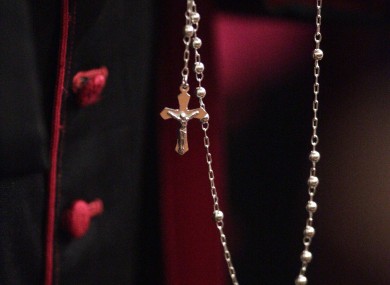THROUGHOUT its considerable history, many attempts have been made to challenge or dilute the power of the Catholic Church.
None have inflicted as much mayhem as the behaviour of the church itself.
In the flurry of scandals engulfing this institution in Ireland, it has been the hierarchy's reaction to clerical sex abuse rather than the crimes themselves which have caused most havoc.
Archbishop Diarmuid Martin clearly realises that.
But amid the upper echelons of the church he represents, this upright and isolated man is a lone voice in the wilderness.
Meanwhile, with their scattergun public statements, often clumsily worded, senior clergyman after senior clergyman demonstrates persistent and perhaps even wilful blindness about the extent of the problem.
Hardly surprising, then, that they seem incapable of offering leadership.
One after another they trot out declarations which probably do more harm than good.
The latest is the Bishop of Raphoe, who has referred to the arrows of a secular and godless culture attacking the Catholic Church.
What slow learners these people are.
How embedded is their sense of entitlement.
Bishop Philip Boyce appears not to understand -- any more than many of his fellows do -- how their arrow wounds are self-inflicted. The authority of the Catholic Church is undermined because the hierarchy's arrogance and narrow self-interest have been revealed.
Not because of godlessness.
Decent Catholic priests on the ground, horrified at the destruction wreaked by their inept leaders, do grasp the extent of the harm.
They are, after all, at the coal face.
Though slow to act initially, some have formed themselves into an Association of Catholic Priests and to their credit make sensible suggestions, such as enhancing the role of the laity.
The association's response to Bishop John Magee's belated statement this week, almost six weeks after the release of the Cloyne Report, is uncompromising.
It calls his remarks "inadequate" and questions whether "like many other senior clerics" he fully understands the extent of the problem.
The association also suggests something more is needed to convince people of the Catholic Church's sincerity.
That shows a better grasp of the facts than a Donegal bishop grumbling about secularisation.
It recognises that the general public is far from persuaded about the Catholic Church's bona fides -- perhaps because it turns to lawyers first, and only drip-feeds admissions when there is no choice but to 'fess up'.
Bishop Magee looked coached for that interview with RTE's Paschal Sheehy.
While he said the right things, his procrastination casts doubt on the good faith underpinning them.
Apologies are most credible when immediate.
By dilly-dallying he damaged himself and the church he represents.
Even after a flurry of scandals, the Catholic Church remains a sophisticated institution with influence and broad appeal, as we saw with the Pope's visits to Britain and Spain.
Yet it operates no discernible cohesive approach to addressing its scandal-ridden status.
Instead, delay, denial and disarray are its modus operandi.
It is baffling for the faithful to witness priests and bishops pulling in different directions.
It is confusing for them to be on the receiving end of a patchwork quilt of personal views from high-ranking officials, rather than a coherent communication policy.
Is reform on the cards?
Hard to say, when bishops concentrate on arguing with critics rather than implementing a strategy to deal with their own shortcomings.
Complaints need to be taken on board and addressed.
But in the Catholic Church's universe, criticism -- even valid or constructive -- is not well received.
There is a distinct 'shoot the messenger' response -- it makes a change from excommunication, the weapon of preference in previous centuries.
Attacks are increasing, not because society is more irreligious but because the Catholic Church continues with inaction or evasive action.
It has lawyers to burn but is light on crisis management.
Signs of Christianity or fellow-feeling for victims are thin on the ground, too.
Condemnation does not spring entirely from anti-Catholic rhetoric, as some apologists insist.
A number of observers are simply expressing the view that the law should apply equally to everyone, and be observed by everyone, irrespective of whether they wear a clerical collar or not.
That's actually what the Catholic Church in Ireland has been missing.
A groundswell of honourable members criticising from within, as Enda Kenny did so eloquently recently.
Too many remain silent.
They hope it is enough to do their personal best and make their individual contributions, and that this allows them to look away from the abuses.
It is not enough.
They prop up a flawed organisation.
They legitimise it and provide it with some semblance of credibility.
They give it no reason to change.
While that situation continues, 'mea not really culpa' apologies such as Bishop Magee's will continue to undercut the Catholic Church.
As personal secretary to three popes, he was an experienced administrator -- his lapse at Cloyne is indefensible.
The best to be said about him is he was oddly incompetent; the worst is that he was careless about child protection and up for his church.
The personal views of bishops, emerging piecemeal, reflect an inability to accept how their behaviour contributes to the present crisis within the Catholic Church.
On the contrary, they feel unjustly frogmarched into the firing line.
Hardworking priests, regrettably tainted by association both with abuse and concealment, have always relied on the support of the people.
But that backing has been weakened by the hierarchy's attitude.
They are ill-served by their leaders.
Perhaps the upper echelons regard transparency and reform as irrelevant, and consider prayer -- and better still, blind obedience -- to be the answer. I say there is no substitute for self help.
But I see precious little evidence of it in the church.
One way forward would be women priests, another is optional celibacy.
Don't hold your breath, though.
Reform is not a swear word -- there is no 11th commandment preventing it.
But someone forgot to tell senior Catholic churchmen.






No comments:
Post a Comment